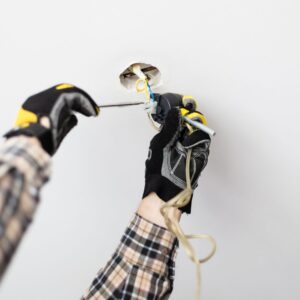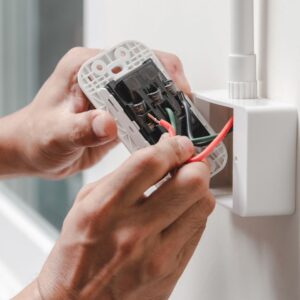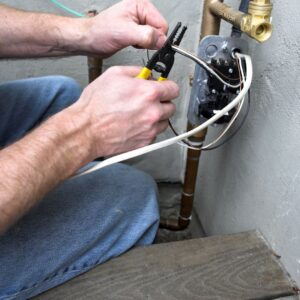When it comes to residential wiring, many homeowners feel overwhelmed and intimidated. However, understanding the basics of electrical systems is crucial for maintaining a safe and functional home. In this beginner’s guide, we’ll demystify residential wiring, providing a comprehensive overview of how electrical systems work and the steps involved in wiring a home.
Learn more, and if you’re in need of a professional electrician in Northern Colorado, look no further than Bret’s Electric. We put safety first at all times, and our employees have the tools and expertise to get the job done right!

Understanding the Basics
Before diving into residential wiring, it’s important to grasp some fundamental concepts. Electricity flows through a series of wires to power various devices and fixtures in your home. The most common types of wires used in residential wiring are copper and aluminum. Copper is preferred due to its conductivity and corrosion resistance.

Types of Wiring
There are several types of wiring used in residential settings:
- Non-Metallic Sheathed Cable (NM): Also known as Romex, NM cable consists of two or more insulated wires wrapped in a plastic sheath. It’s commonly used for indoor wiring.
- Armored Cable (AC): AC cable has a metal sheath for added protection. It’s suitable for both indoor and outdoor applications.
Understanding the different types of electrical wiring systems is crucial for ensuring safety and reliability in your home or building. A professional electrician is essential when adding new wiring in your home because they will understand the different types of wiring for different applications.

Understanding Circuits
A circuit is a loop that allows electricity to flow from a power source to the different devices or fixtures in your home. It consists of three main components:
- Power Source: This can be a breaker panel or fuse box.
- Conductive Wires: These carry electricity throughout the circuit.
- Loads: Devices and fixtures that consume electricity.
Each circuit is protected by a breaker or fuse to prevent overloading and electrical hazards.
Working with Outlets and Switches
Outlets provide a connection point for electrical devices, while switches control the flow of electricity to lights or other fixtures. When installing or replacing outlets and switches, follow proper wiring diagrams and safety precautions1.

When to Consult a Professional Electrician
While understanding the basics of electrical wiring empowers homeowners, there are situations where it’s crucial to seek professional assistance. Here are scenarios when consulting an electrician is essential:
- Complex Projects: If your wiring project involves intricate tasks such as rewiring an entire room or installing a new circuit, it’s best to hire a professional electrician. They have the expertise to handle complex wiring safely and efficiently.
- Old or Damaged Wiring: Outdated or damaged wiring poses serious risks. Signs of trouble include flickering lights, tripped breakers, or exposed wires. A professional can assess the situation, identify faulty wiring, and recommend necessary repairs or replacements.
- Safety Concerns: Electrical work carries inherent dangers. If you’re unsure about safety precautions or lack experience, don’t risk it. An electrician will follow safety protocols, ensuring your home remains hazard-free.
- Upgrading Electrical Panels: Upgrading your electrical panel to accommodate additional circuits or higher loads requires professional expertise. An electrician can assess your needs, recommend the right panel, and perform the installation.
- Code Compliance: Local building codes dictate wiring standards. A professional electrician ensures your project adheres to these codes, preventing future issues and ensuring safety.
Contact a Professional Electrician
Remember, safety is paramount when working with electricity. Always turn off the power before making any electrical connections, and consider consulting a professional electrician for electrical projects. While DIYing electrical projects can seem enticing and a way to save money, electricity is dangerous and it’s important to have a professional handle the job. Contact a Northern Colorado electrician at Bret’s Electric — we have the expertise to get the job done safely.
